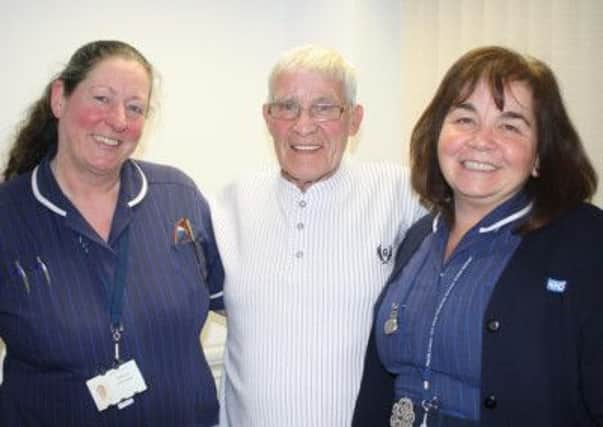Rapid response service to the rescue for James


Used to his home comforts, the 74-year-old didn’t want to spent a week cooped up on a ward if he could receive hospital treatment at home.
So he was able to take up a rapid response service offered by Blackpool Teaching Hospitals NHS Foundation Trust.
Advertisement
Hide AdAdvertisement
Hide AdAlmost as soon as he informed the team of his swollen leg, a community matron was at his Stalmine home to check up on him.
Mr Harris said: “The first thing we had to do she said was get me an nebuliser, and within a couple of hours some nurses came and set one up. Naturally I calmed down a bit, but I was still worried about my leg – I wanted it to do down.
“That was the Saturday and I was alright on Sunday. On Monday another nurse came in to take a sputum, water and blood sample.”
The following day, physiotherapist Sheila Dryden visited with an apprentice and they went through an exercise plan with Mr Harris. The revisited over the week to cut back on his nebuliser use and give him stronger exercises. Each day community nurses came over and checked Mr Harris’s chest and lungs, blood pressure and pulse.
Advertisement
Hide AdAdvertisement
Hide Ad“Basically I had nursing care 24-7 over eight days and believe you me, they were brilliant,” he said.
“Each one of them informed me what I should be doing and if I had a relapse what I should do.
“They gave me a phone number if I needed to get in touch with them and honestly I haven’t got one grumble.
“They explained to me right from the start that I could go to hospital if I wanted to, but I said no.
Advertisement
Hide AdAdvertisement
Hide Ad“I didn’t want that because first and foremost I have panic attacks. At home I was able to get out of bed and walk about my own home if I wanted to. But then if I had a relapse I could call for an ambulance in the middle of the night and I would go straight onto the ward I needed.
“The nurses know you and you know them. They come for one thing, and that’s to help you. The whole team was absolutely brilliant.
“Without that help I would have been in hospital for the whole week.
“By the end of the week, after the care I received, my leg had gone down and I was able to get about.”
Advertisement
Hide AdAdvertisement
Hide AdThe swelling in Mr Harris’slegs was down to a problem in his heart.
His wife, Elizabeth, said having him at home during his treatment was a weight off her mind.
She said: “The team gave us both confidence. You always feel better if you’re at home and it was more relaxing for him.”
Rapid Response team leader, Sue Townend said: “The primary aim of this service is to prevent hospital admissions and cut the number of days of an inpatient stay.
Advertisement
Hide AdAdvertisement
Hide Ad“Someone might be clinically ready to be discharged, and we can provide social and medical support at their home with input from clinicians and social workers to help them.
“Whatever their needs are, as long as it is safe to do so, we can prevent them going to hospital.”
Follow us on twitter @The_Gazette and like our page on facebook to keep up with all the latest news.